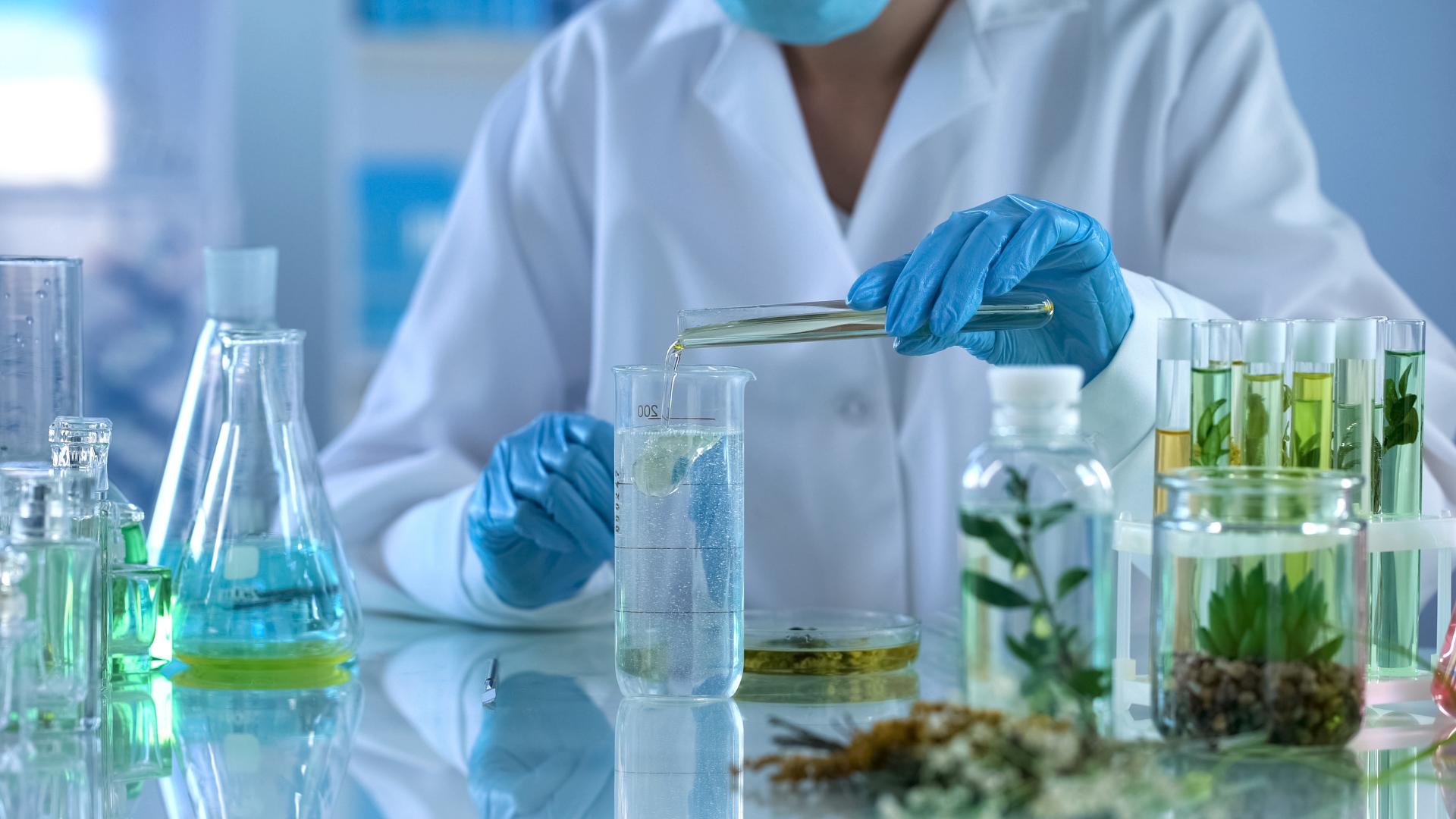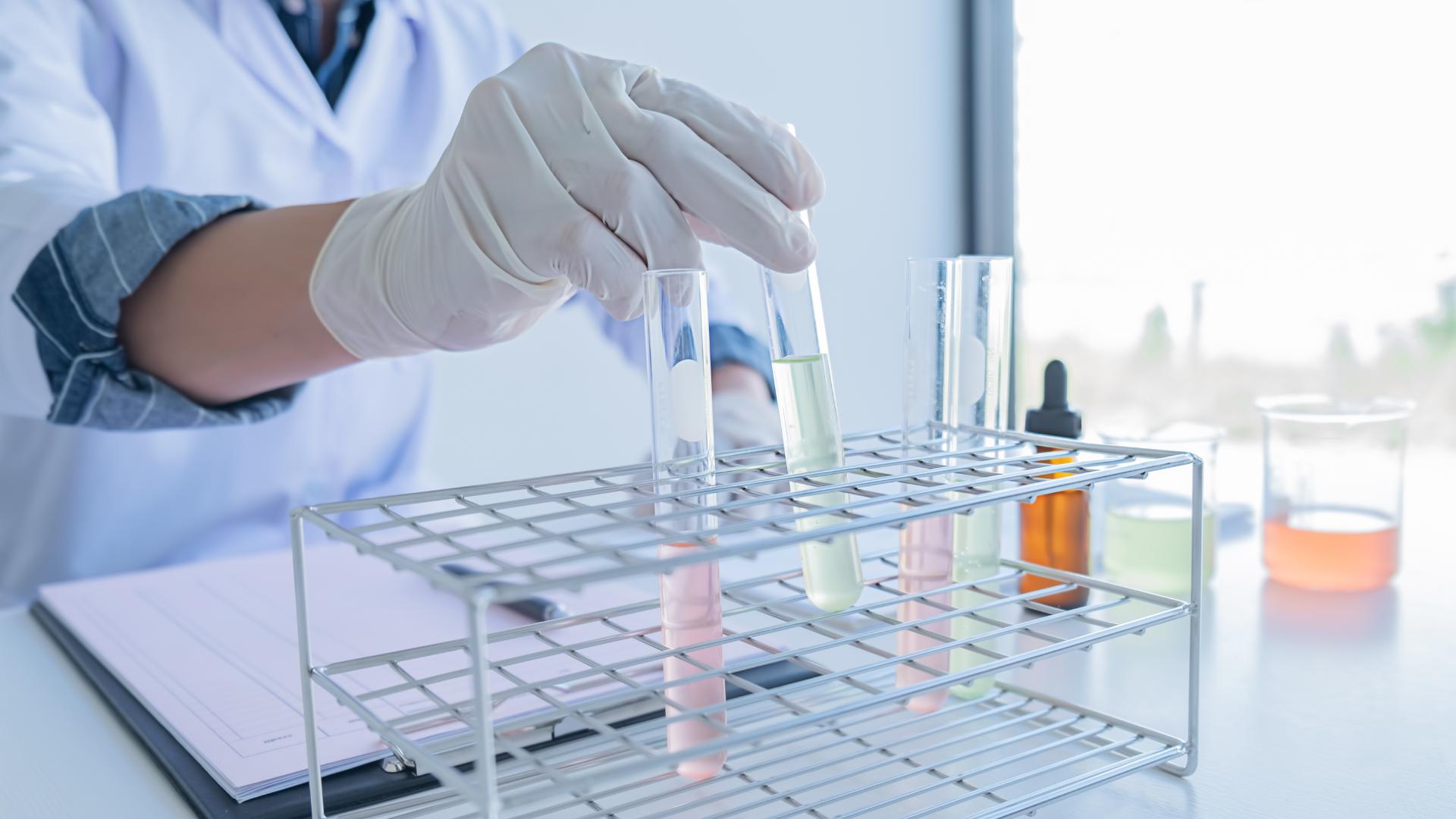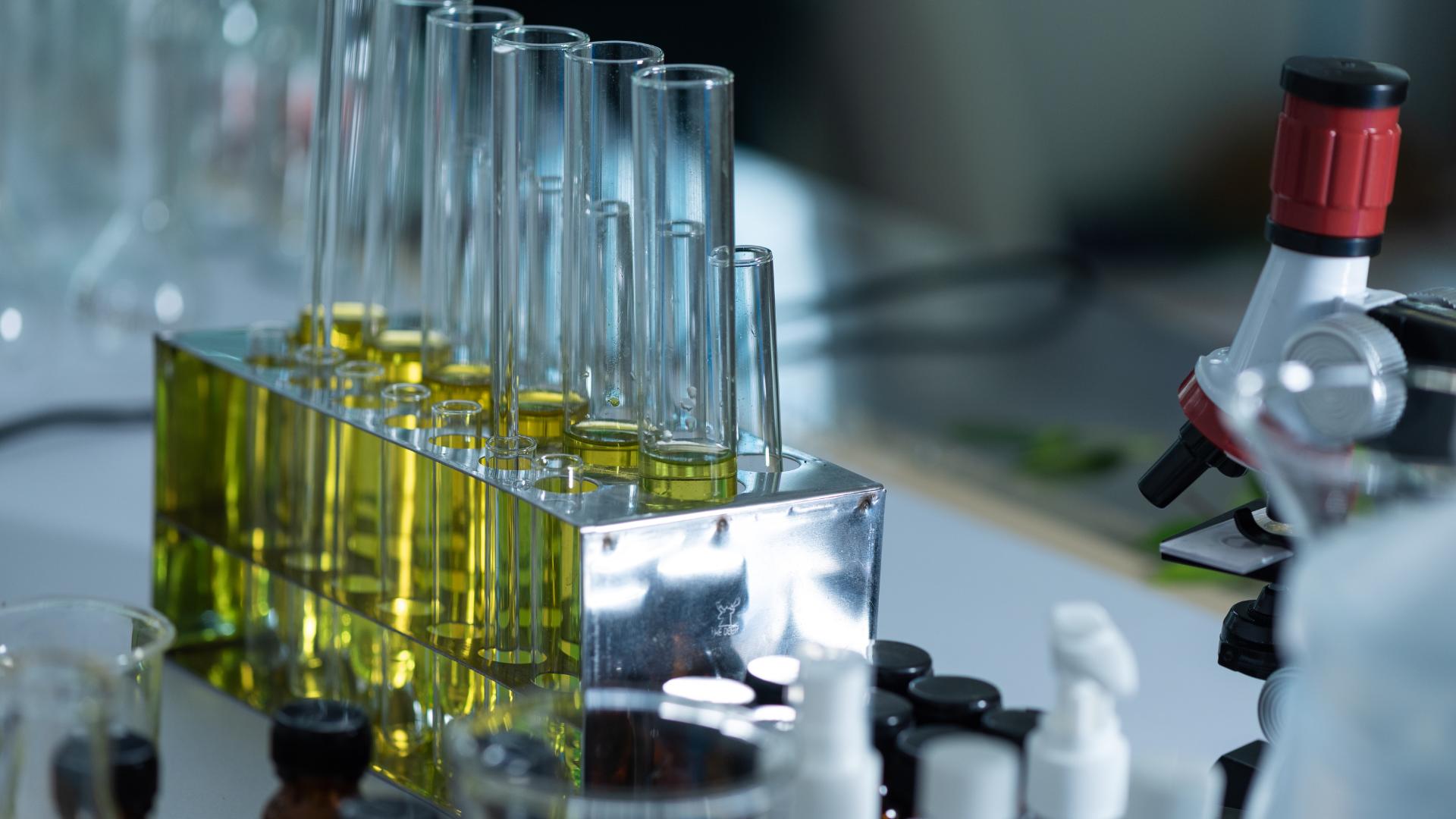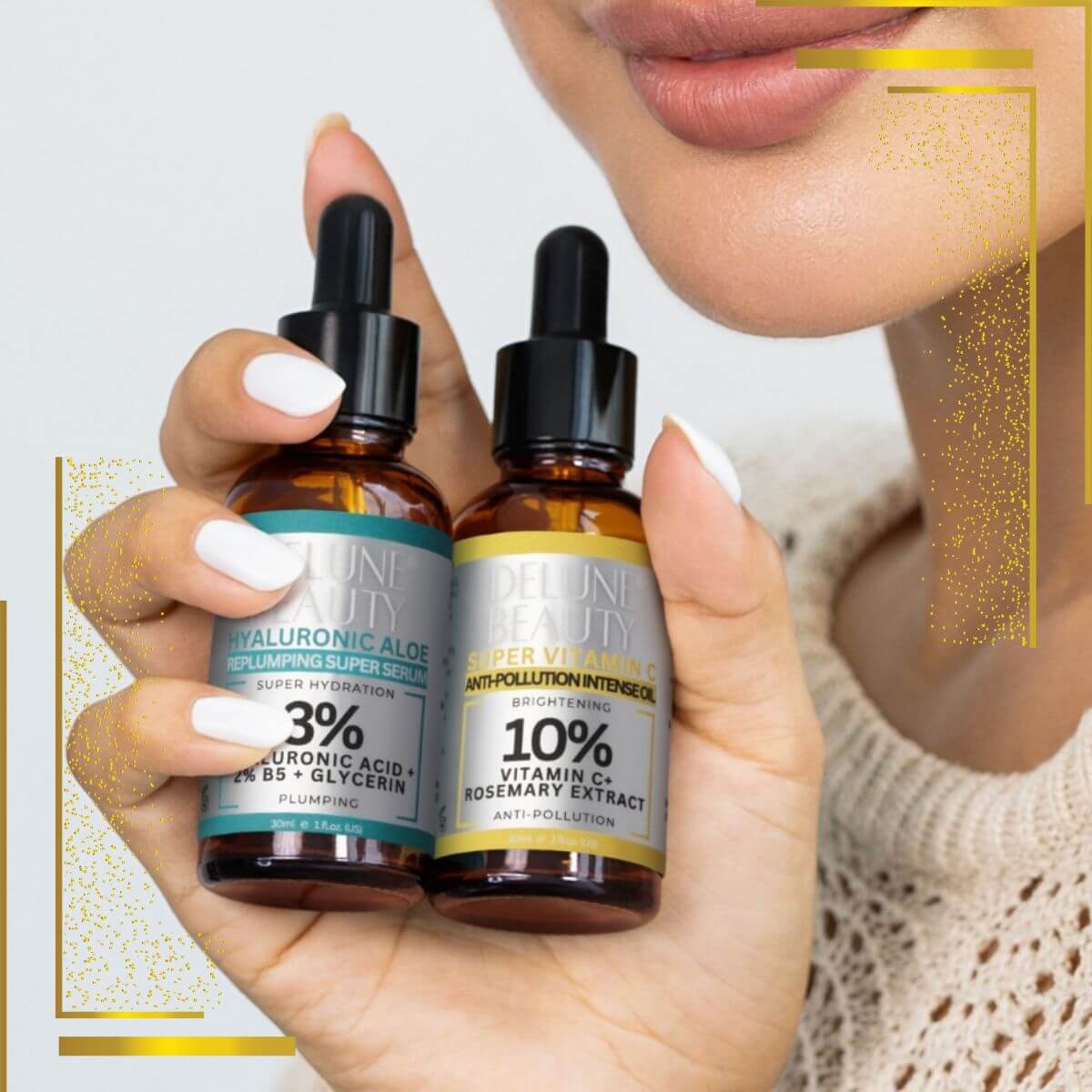Ensuring Essential Oil Safety
Setting the Gold Standard with PristiQuant™
At the heart of Delune is an unwavering commitment to quality. Our proprietary PristiQuant™ system reflects this — a science-led, multi-checkpoint protocol that sets a new industry benchmark for purity and safety.
Precision in Every Drop
Every batch of Delune essential oils undergoes meticulous evaluation — from visual and olfactory analysis to advanced instrumentation such as Gas Chromatography-Mass Spectrometry (GC-MS), Fourier-Transform Infrared Spectroscopy (FTIR), and DNA authentication. Our team works to ensure each oil is precisely aligned with its botanical integrity.
40+ Analytical & Purity Tests
The PristiQuant™ Assurance Spectrum spans over 40 scientifically validated tests — encompassing everything from microbial screening and pesticide residue to optical rotation and antioxidant levels. The goal: to deliver verified oils of uncompromising quality, safety, and traceability.
| Test Name | Purpose | How It's Done |
|---|---|---|
| Appearance | Evaluate the visual characteristics of raw materials and finished goods. | Visual inspection is done to assess the color, clarity, and overall appearance of the oils. |
| Color | Assess the color of raw materials and finished goods. | Colorimetric analysis is performed to measure the hue, intensity, and transparency of the oils. |
| Fill Volume | Determine the accurate fill weight and volume of each product. | Precise measurements are taken to ensure each container is filled with the correct amount of oil. |
| Flash Point and Sustained Burn | Assess the flammability and safety of the oils. | The Setaflash Series 3 Flashpoint Tester is used to determine the flash point and sustained burn characteristics. |
| Formaldehyde | Detect and quantify the presence of formaldehyde. | A specific assay is employed to measure the formaldehyde content in the oils. |
| FTIR | Identify and analyze the molecular composition of the oils. | The Cary 630 FTIR equipment is used for Fourier Transform Infrared Spectroscopy analysis. |
| Odor/Aroma | Evaluate the scent of raw materials and finished goods. | Trained assessors conduct sensory evaluations to assess the odor and aroma of the oils. |
| Optical Rotation | Determine the optical rotation properties of the oils. | The Autopol III Polarimeter is used to measure the optical rotation angle. |
| Peroxide Value | Assess the level of oxidation in the oils. | The AOAC Peroxide Value Determination method is employed to measure peroxide content. |
| Quaternary Ammonium Compounds | Identify and quantify the presence of QACs. | Analysis of QACs is done by titration using appropriate chemical reagents. |
| Refractive Index | Measure the refractive index of the oils. | The J257 Refractometer is utilized to determine the refractive index. |
| Specific Gravity (for oils) | Determine the specific gravity of the oils. | The DDM 2911 Density Meter is used to measure the specific gravity. |
| Turbidity | Measure the cloudiness or haziness of the oils. | The Hach 2100N Turbidity Meter is employed for turbidity measurements. |
| Viscosity | Assess the thickness and flow properties of the oils. | The Brookfield DV1 Viscometer is used to measure the viscosity. |
| VOC % | Determine the percentage of volatile organic compounds in the oils. | Analytical techniques are employed to measure the VOC content. |
| All Volatile Compounds in Essential Oils | Identify all components in the essential oils using gas chromatography and mass spectrometry. | Gas chromatography coupled with mass spectrometry (GC/MS) is used for qualitative analysis of the oils. |
| Arsenic, Cadmium, Mercury, and Lead | Detect and quantify heavy metals in the oils. | ICP-MS (Inductively Coupled Plasma Mass Spectrometry) is used for heavy metal analysis. |
| 3-O-Acetyl-11-keto-beta-boswellic acid, 3-O-Acetyl-alpha-boswellic acid, 3-O-Acetyl-beta-boswellic acid, alpha-boswellic-acid, beta-boswellic acid and 11-keto-beta-boswellic-acid | Analyze specific boswellic acids in the oils. | LC-MS (Liquid Chromatography-Mass Spectrometry) is used for analysis and quantification of these compounds. |
| Burkholderia cepacia | Screen for the presence of Burkholderia cepacia bacteria. | Specific screening tests are conducted to detect the presence of Burkholderia cepacia. |
| Candida albicans | Screen for the presence of Candida albicans yeast. | Specific screening tests are conducted to detect the presence of Candida albicans. |
| Escherichia coli | Screen for the presence of Escherichia coli bacteria. | Specific screening tests are conducted to detect the presence of Escherichia coli. |
| Pseudomonas aeruginosa | Screen for the presence of Pseudomonas aeruginosa bacteria. | Specific screening tests are conducted to detect the presence of Pseudomonas aeruginosa. |
| Staphylococcus aureus | Screen for the presence of Staphylococcus aureus bacteria. | Specific screening tests are conducted to detect the presence of Staphylococcus aureus. |
| Yeast and Mold | Assess the yeast and mold counts in the oils. | Plate counts are performed to determine the presence of yeast and mold in the oils. |
| Salmonella species | Screen for the presence of Salmonella bacteria. | Specific screening tests are conducted to detect the presence of Salmonella species. |
| Total Plate Count | Measure the total number of viable microorganisms in the oils. | Plate counts are performed to determine the total number of viable microorganisms. |
| Coliforms; BTGN; Enterobacteriaceae | Test for specific bacteria groups that indicate product contamination. | Various testing methods are employed to detect the presence of coliforms, BTGN, and Enterobacteriaceae. |
| Residual Solvent Analysis | Screen for any residual solvents from the extraction process. | Gas chromatography or other analytical methods are used to detect and quantify any residual solvents. |
| Microbial Identification | Identify specific microbial species to ensure product purity and safety. | Molecular methods, such as PCR and DNA sequencing, are used for microbial identification. |
| Herbicide and Pesticide Residue Analysis | Detect the presence of herbicide and pesticide residues in the oils. | Various analytical techniques, such as GC-MS or LC-MS, are used for residue analysis. |
| Shelf-Life Stability Testing | Assess the stability and quality of the oils over time. | The oils are stored under controlled conditions, and periodic testing is performed to evaluate changes over time. |
| Chiral Analysis | Determine the chirality of certain components in the oils. | Chiral chromatography or other methods are used to analyze and quantify the different stereoisomers. |
| Ethical Sourcing Verification | Ensure the oils are sourced sustainably and ethically. | Verification is done through supply chain audits and documentation to confirm ethical practices. |
| Certificate of Analysis (CoA) | Provide transparent information on test results for each batch of oils. | Each batch of oils is tested, and a CoA is issued with detailed results, which can be accessed by customers. |
| Traceability | Establish a clear record of each oil's origin and processing. | A robust system is implemented to trace the oils from raw material sourcing to the final product. |
| Irradiation Testing | Screen for the presence of ionizing radiation in the oils. | Irradiation testing is conducted using approved methods to ensure the absence of radiation. |
| DNA Authenticity Analysis | Verify the authenticity of the oils by comparing DNA profiles. | PCR-based techniques are used to compare DNA profiles with reference samples. |
| Stability Testing | Evaluate the physical and chemical stability of the oils under different conditions. | The oils are subjected to varying environmental conditions, and their stability is assessed over time. |
| Antioxidant Content Analysis | Measure the levels of antioxidants in the oils. | Appropriate chemical assays are employed to quantify the antioxidant content of the oils. |
| Nutritional Profile Analysis | Assess the nutritional composition of certain oils, such as fatty acid content. | Analytical methods, like gas chromatography or spectrophotometry, are used to determine nutritional profiles. |
📌 Note: The PristiQuant™ system is exclusive to Delune but available for brand licensing to approved partners seeking independent verification and elevated consumer trust.
Excellence at Every Step
-

Amplifying Safety and Ethics in Every Drop
Safety is our non-negotiable priority. Our oils are rigorously screened for microbial contaminants, heavy metals, and other potential hazards. Ethical sourcing is more than a tagline for us—it's a pledge that extends to the communities we impact and the environment we cherish.
-

Pioneering Quality and Authenticity
As pioneers in the field, we're not just breaking barriers—we're setting new standards. Choosing Delune means embarking on a journey toward authenticity and well-being. Each bottle is a testament to the care and passion that go into its crafting, capturing nature's purest essence.
-

Experience the Distinctive Quality of Delune
Delune transcends mere oils to embody a philosophy of excellence and trust. Immerse yourself in the Delune experience and let our oils bring harmony into your life. Enter a realm where quality is limitless and where each drop resonates with nature's essence.
Trust Only in ✔️PristiQuant™-Certified Quality
In the world of quality assurance, Delune is unparalleled, setting new benchmarks with our exclusive PristiQuant™ system. Through a rigorous suite of over 40 tests, we're redefining industry standards to ensure unparalleled purity in every drop. And for those seeking an even higher level of ethical sourcing, we invite you to explore our Field to Sealed promise, featuring our organic Wellness Grade oils.
Collapsible content
What is PristiQuant™, and how does it make Delune's essential oils stand out?
PristiQuant™ is Delune’s proprietary quality assurance system — a multi-phase testing protocol with over 40 checkpoints that analyze purity, safety, composition, and authenticity. It's how we take essential oil quality from standard to exceptional.
How does the PristiQuant™ Assurance Spectrum benefit consumers seeking high-quality oils?
The Assurance Spectrum is our internal benchmark system — measuring everything from GC-MS purity markers to traceability and sustainability. For the end customer, it means every bottle is traceable, tested, and transparently verified.
How does Delune ensure safety and authenticity in essential oils?
We screen every batch for contaminants, adulterants, synthetic fillers, and heavy metals. Beyond regulatory compliance, PristiQuant™ gives us an additional internal layer of assurance — because we believe safety and authenticity should never be optional.
Why should people care about Delune's essential oils versus others?
Most essential oils are sold on vague purity claims. Delune’s oils are backed by a concrete testing system, consistent batch traceability, and scientific documentation. PristiQuant™ helps us meet a higher standard — and gives our customers confidence in every drop.
How does PristiQuant™ contribute to Delune’s leadership in the essential oil industry?
PristiQuant™ is part of what makes Delune different — and trusted. By investing in analytical infrastructure typically reserved for labs, we’ve positioned ourselves as a quality-first brand that’s ready for scale, export, and global compliance.
Can other brands use PristiQuant™?
PristiQuant™ is a proprietary system developed by Delune, but we do offer brand licensing for select partners. This allows other companies to access our testing framework and quality seals — ideal for those who want third-party validation with real weight.
What’s the story behind the name “PristiQuant™”?
It’s simple: “Pristine” and “Quantified.” We wanted a name that reflected what we stand for — pure ingredients, backed by measurable science. What started as an internal lab protocol has evolved into one of the most robust assurance frameworks in the aromatherapy sector.










